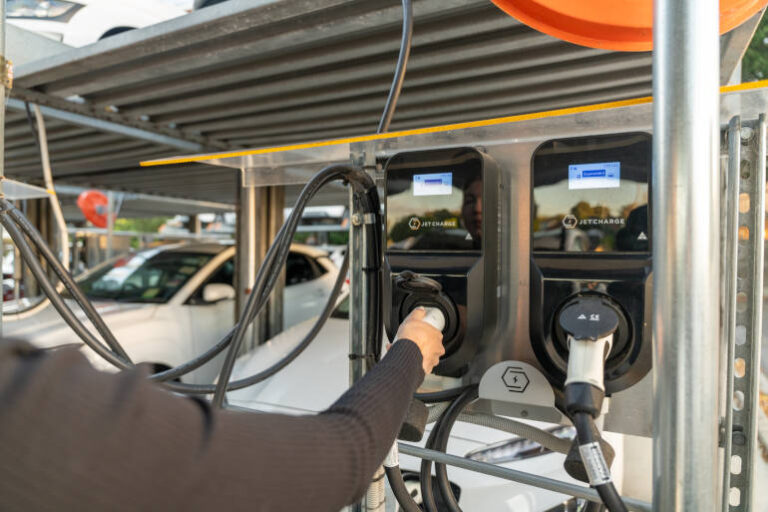Speaking at the 2025 Smart Energy Expo in Sydney, Geof Alexander, Chief Product Officer at JET Charge, outlined how the company is helping fleets and energy users tackle one of the most complex parts of the electric transition—charging infrastructure. With a clear focus on reliability and local capability, Alexander stressed that success in electrification depends on designing charging systems that reduce total cost of ownership (TCO), maximise uptime, and scale effectively.
“Our mission is around making easy charging for everyone,” Alexander said. “And the way you’re going to do that is you’re going to be able to drive the long-term economics, drive the value, not just of the charging, but of the electricity and how that electricity is used.”
Fleet Electrification is Accelerating
According to Alexander, Australia is entering a new phase of EV fleet transition. While early adopters trialled one or two vehicles, today’s fleet operators are looking to deploy EVs across dozens—sometimes hundreds—of depots.
“These aren’t pilot projects anymore,” he explained. “They’re asking: how do we get a solution that scales over 100 sites across Australia?”
This shift is driven by global momentum, falling battery prices, and the rapid improvement of Chinese and European electric trucks. But the real tipping point, he argued, will come when EVs deliver lower TCO. While electric trucks often have a higher purchase price, savings on fuel and maintenance—when paired with smart infrastructure—can tip the scales.
Reliability > Uptime
Alexander made a clear distinction between system uptime and what truly matters for fleet operators: reliability. “They don’t care about charge success rates,” he said. “They want the vehicle charged and ready to go in the morning.”
He shared an example where inconsistent charging was traced back to poor driver training and a lack of integration. Damaged cables and confusion around charging steps led to low reliability, despite the chargers being technically ‘online’.
This is why JET Charge takes a vertically integrated approach—supplying and managing everything from hardware and software to project management and ongoing operations.
Local Solutions Built in Australia
Alexander highlighted that JET Charge manufactures its own hardware—including its ChargeMate unit and load management devices—locally in Melbourne. This gives the company tighter control over quality, responsiveness and the ability to innovate for Australian conditions.
One of the key innovations is a localised load management controller that enables depots to run more chargers than their grid connection would normally allow. It works offline if needed and distributes power intelligently based on vehicle needs and site priorities.
A Software Platform That’s Hardware-Agnostic
JET Charge also offers a software platform that manages the entire charging ecosystem—supporting multiple charger brands and EV types. It gives fleet operators visibility across their network and helps them respond to faults, track performance, and optimise energy use.
“We don’t want our customers locked into particular vendors,” Alexander said. “The technology is changing too quickly.”
Charging-as-a-Service: Taking the Risk Off the Table
Not every business wants to manage charging hardware or worry about maintenance. That’s why JET Charge is expanding its Charging-as-a-Service offering, where clients pay a single monthly fee and JET Charge takes full responsibility for uptime, performance, and reporting.
This model is already being rolled out across public sites and fleet homes with the help of an ARENA grant. It’s especially attractive for employers who want to offer home charging to employees but don’t want to deal with safety, uptime, or reimbursement.
“Charging is best done where the vehicle is at rest,” Alexander noted. “For a lot of fleets, that means the home.”
What Comes Next
As depots grow in size and complexity, Alexander expects dynamic load management and deeper integration between vehicle scheduling, energy usage, and software platforms to become essential.
“Operational integrity is crucial,” he said. “It’s no longer just about having a charger—it’s about how the entire system works together.”
JET Charge’s focus on reliability, integration and local capability puts it at the centre of Australia’s fleet electrification journey. With 3,500+ chargers already connected to its platform and a deep pipeline of projects, the company is positioning itself as both a technology leader and a long-term partner in the EV transition.





